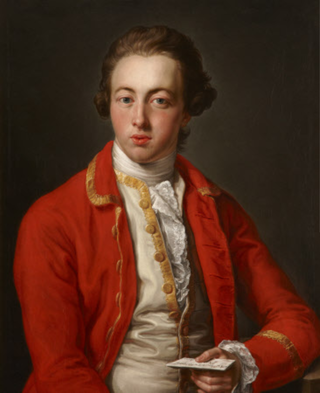Related Research Articles

The chancellor of the Exchequer, often abbreviated to Chancellor, is a senior minister of the Crown within the Government of the United Kingdom, and head of His Majesty's Treasury. As one of the four Great Offices of State, the chancellor is a high-ranking member of the British Cabinet.

John Smith (1656–1723) of Tedworth House, Hampshire, was an English politician who sat in the English and British House of Commons between 1678 and 1723. He served as Speaker and twice as Chancellor of the Exchequer.
The Chancellor of the Exchequer of Ireland was the head of the Exchequer of Ireland and a member of the Dublin Castle administration under the Lord Lieutenant of Ireland in the Kingdom of Ireland. In early times the office was sometimes called the Chancellor of the Green Wax. In the early centuries, the Chancellor was often a highly educated cleric with knowledge of Finance. In later centuries, when sessions of Parliament had become regular, the Chancellor was invariably an MP in the Irish House of Commons. Walter de Kenley, Chancellor from 1292 until his death, was both a judge of the Court of Common Pleas (Ireland) and a distinguished military commander who gave good service against the Gaelic clans of County Wicklow.

Alan Brodrick, 1st Viscount Midleton, PC (Ire) was a leading Irish lawyer and Whig politician who sat in the Parliament of Ireland between 1692 and 1715 and in the British House of Commons from 1717 to 1728. He was Speaker of the Irish House of Commons and Lord Chancellor of Ireland. Although he was a man of great gifts, he was so hot-tempered that even Jonathan Swift is said to have been afraid of him.
Richard Meredith was the Church of Ireland Bishop of Leighlin from 1589 until his death.
Sir James Dalrymple, 2nd Baronet was Member of Parliament for Haddington Burghs and the Principal Auditor of the Exchequer in Scotland.

John Scrope was a British lawyer and politician who sat in the House of Commons from 1722 to 1752.
Sir Richard Levinge, 1st Baronet was an Irish politician and judge, who played a leading part in Irish public life for more than 30 years.
Sir Maurice Eustace was an Irish landowner, politician, barrister and judge of the seventeenth century who spent the last years of his career as Lord Chancellor of Ireland. This was an office for which he felt himself to be entirely unfit, and in which he was universally agreed to be a failure.
There have been two baronetcies created for persons with the surname Meredyth, both in the Baronetage of Ireland. Both are extinct.

Sir John Parnell, 2nd Baronet was an Anglo-Irish Member of Parliament.

William Brownlow PC (I) of Lurgan, County Armagh was an Anglo-Irish politician.
Philip Savage was an Anglo-Irish lawyer and politician who was Chancellor of the Exchequer of Ireland.
Bruno Talbot was an English Jacobite who was Chancellor of the Exchequer of Ireland during the Glorious Revolution and Williamite War in Ireland.
Sir Robert Meredyth was an Irish politician and lawyer who served as Chancellor of the Exchequer of Ireland.
Charles Meredyth was an Irish politician.
Arthur Meredyth was an Irish politician.
Sir Marcus Somerville, 4th Baronet was an Anglo-Irish politician.
Sir Richard Meredyth, 2nd Baronet was an Anglo-Irish politician.
Sir William Meredyth, 1st Baronet was an Anglo-Irish soldier and politician.
References
- ↑ Kenny, Colum (2015). "Meredith (Meredyth), Robert". Dictionary of Irish Biography. Retrieved 13 February 2023.
- ↑ McGrath, Charles Ivar Vincent, The Irish Revenue System: Government and Administration, 1689-1702 (Queen Mary and Westfield College, 1997), p.137 (Retrieved 28 October 2022).
- ↑ E. M. Johnston-Liik, MPs in Dublin: Companion to History of the Irish Parliament, 1692-1800 (Ulster Historical Foundation, 2006), p.107 (Retrieved 28 October 2022).